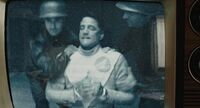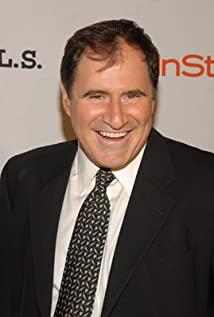The Coen brothers are serious about showing their "anti-bones". The Coen brothers deconstructed the family, religion, race, and school system, repeating the complicated, boring, and at the same time, changing dreamscapes, searching for rabbis and other passages. In the process, we can discover the original face of life, and the core of these is serious.
As a physics professor, Larry has studied Schrödinger's cat-uncertainty principle for most of his life. Although he can write a blackboard formula, the conclusion is only simplified into three words: uncertainty. While the students were at a loss, he was helpless about his own life: his wife cheated and asked him to move out in a high-sounding manner, his son resisted growing up, and his daughter, although she had passed the bar mitzvah, was also in a confused stage of growing up. The joke of the coming-of-age ceremony, there is also a Arthur who has accomplished nothing in his home.
Funny scene in 1/3 of the son trying to steal back his music player, the son comes to the office impulsively smoking marijuana but gets nothing, the next scene is back home, followed by Larry taking a ladder to the roof Adjusting the antenna, under the influence of the constant potency of marijuana, we can construct the hallucination of the father under the influence of seeing a sexy naked woman sunbathing, followed by a medium shot of Larry's expression looking up slightly Another pan to point at the sun, all of which implies that this is just Larry's fantasy. Sexual desire is often absent in the films of the Coen brothers, and naturally it is also a hidden pain in the heart of every middle-aged loser. The Coen brothers are good at showing these completely, and it is their reaction that fully matches their loser's characteristics. In "American Beauty" Kevin Spacey chooses to pursue desire, but the protagonists of the Coen brothers always go beyond the maturity of their perspective, or resign themselves to life, bowing their heads to life and being overwhelmed by life. However, Larry still cares in his heart. In many nightmares in the latter part of the film, Syed (Larry's wife's cheating object) roared at him: I green you. And this care is not necessarily a subconscious care about sexual desire, it is more likely to be attachment to the family, even if it is a superficial stable and connected relationship. Larry doesn't necessarily care that his wife greens him, he cares more that his wife is about to be taken away.
Aside from the paragraph about Asians, it's not that I think there are racial discrimination and other phenomena (of course, the element of race is necessary), but it is just too joking to lose the space for serious interpretation. This paragraph is important, This is followed by a passage where Larry goes to find one rabbi for help. We found that "we still don't have a good life after listening to so many truths." These rabbis, as symbols of religion, are still useless to give Larry advice one by one. The film is completely ineffective and exists as a joke. The teaching process of the spiritual mentors and rabbis was interrupted by various other stories. Such interruption effect not only brought alienation effect, but also brought a sense of comedy, the feeling of "what is the use of these stories tm you tell" Interrupting our viewing time and time again.
And of course there are inescapable dreams. We find that the pattern of passages in the rabbis is similar and repetitive. In this monotonous repetition we can find the unchanging pattern of religion as a healing function. In addition, we also Larry's confusion and desire can be found in his dreams. Larry is still writing on the blackboard in the dream, and he falls into a vortex of desire in an oppressive composition. We can also interpret it as: his anger and powerlessness are like this incomprehensible test. The principle of uncertainty is doomed. Under the oppressive work pressure and family pressure, his final choice seems to be at the mercy of life. We can also see Larry's desire for the neighbor's wife in the dream.
Going back to Larry's experience and the people around him, especially when Larry was stalked by Said, there is naturally a joke about a stupid thief-style crime, and it also shows a cruel theme. It seems that our happiness in life can only be achieved. Built on the search for someone worse than us, Larry was lucky: a college professor, a son and a daughter, and a car accident that just broke down, Syed lost his life, and Larry was shampooing upstream and found downstream. When the water turns green it turns out that Arthur, the homeless more Loser, really has nothing. The cruelty of life and people is presented again. There are always people who are worse than you, and you will not be a very lucky person, and you can only seek a little solace in the situation of people who are more miserable.
At the end of the film, Larry succumbed to life (of course, this also used an anti-climax method, but he seemed to have his own small entanglement in his heart, which was added by chatting with masturbation), and the sudden storm was like Altman. Like the earthquake in the movie, it comes suddenly, life itself is like this, boring and full of unknowns at the same time, as unpredictable as the uncertainty theorem, you can only accept fate, as long as the life goes well, even if the head is a little green, for individuals, life is stable. It continued with some twists and turns, but everyone led the society to a crossroads in such a changing society, just like the flag that fluttered at the end,
Under the impression of various elements in the film, what we see is a microcosm of a society. The United States may change because of this, but at the same time, it is fate to come to this intersection. The rainstorm is coming, where is the United States going, and the family is in the delicate warmth Qualitative changes have already taken place in China, these slow evolutions are uncontrollable, and the outcome is unpredictable. It is still like the uncertainty principle. We have tried our best to calculate and can only prove in the end: uncertainty.
View more about A Serious Man reviews











